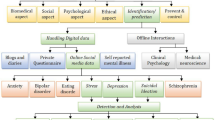Abstract
Mental health is one of the pressing issues during the COVID-19 pandemic. Psychological distress can be caused directly by the pandemic itself, such as fear of contracting the disease, or by stress from losing jobs due to the disruption of economic activities. In addition, many government measures such as lockdown, unemployment aids, subsidies, or vaccination policy also affect population mood, sentiments, and mental health. This paper utilizes deep-learning-based techniques to extract sentiment, mood, and psychological signals from social media messages and use such aggregate signals to trace population-level mental health. To validate the accuracy of our proposed methods, we cross-check our results with the actual mental illness cases reported by Thailand’s Department of Mental Health and found a high correlation between the predicted mental health signals and the actual mental illness cases. Finally, we discuss potential applications that could be implemented using our proposed methods as building blocks.
Access this chapter
Tax calculation will be finalised at checkout
Purchases are for personal use only
Similar content being viewed by others
References
Bojanowski, P., Grave, E., Joulin, A., Mikolov, T.: Enriching word vectors with subword information. Trans. Assoc. Comput. Linguist. 5, 135–146 (2017). https://transacl.org/ojs/index.php/tacl/article/view/999
Bollen, J., Mao, H., Zeng, X.: Twitter mood predicts the stock market. J. Comput. Sci. 2(1), 1–8 (2011)
Breiman, L.: Random forests. Mach. Learn. 45(1), 5–32 (2001). https://doi.org/10.1023/A:1010933404324
Brooks, S., et al.: The psychological impact of quarantine and how to reduce it: rapid review of the evidence. Lancet 395 (2020). https://doi.org/10.1016/S0140-6736(20)30460-8
Thailand’s Department of Mental Health: Report on access to services of patients with depression (2020). https://thaidepression.com/www/report/main_report/. Accessed 15 Jan 2021
Chawla, N.V., Bowyer, K.W., Hall, L.O., Kegelmeyer, W.P.: Smote: synthetic minority over-sampling technique. J. Artif. Intell. Res. 16, 321–357 (2002). https://doi.org/10.1613/jair.953
Choi, H., Varian, H.: Predicting the present with Google trends. Econ. Rec. 88, 2–9 (2012)
Devlin, J., Chang, M.W., Lee, K., Toutanova, K.: Bert: pre-training of deep bidirectional transformers for language understanding (2019)
Frank, R., McGuire, T.G.: Mental health treatment and criminal justice outcomes. Working Paper 15858, National Bureau of Economic Research, April 2010. https://doi.org/10.3386/w15858, http://www.nber.org/papers/w15858
Go, A.: Sentiment classification using distant supervision. cS224N Project Report (2009)
Higgins, P.C.: GDPNow: a model for GDP ‘nowcasting’ (2014)
Noble, W.S.: What is a support vector machine? Nat. Biotechnol. 24(12), 1565–1567 (2006)
Pedregosa, F., et al.: Scikit-learn: machine learning in Python. J. Mach. Learn. Res. 12, 2825–2830 (2011)
Samrat, S.: DepressionTweets (2020). https://www.kaggle.com/samrats/depressiontweets/. Accessed 10 Dec 2020
Schuster, M., Paliwal, K.K.: Bidirectional recurrent neural networks. IEEE Trans. Signal Process. 45(11), 2673–2681 (1997). https://doi.org/10.1109/78.650093
Tariq, S., et al.: A novel co-training-based approach for the classification of mental illnesses using social media posts. IEEE Access 7, 166165–166172 (2019). https://doi.org/10.1109/ACCESS.2019.2953087
Elvis & Hugging Face Team: Emotions dataset for NLP (2020). https://www.kaggle.com/praveengovi/emotions-dataset-for-nlp. Accessed 8 Dec 2020
Torales, J., O’Higgins, M., Castaldelli-Maia, J.M., Ventriglio, A.: The outbreak of covid-19 coronavirus and its impact on global mental health. Int. J. Soc. Psychiatry 66(4), 317–320 (2020). https://doi.org/10.1177/0020764020915212. pMID: 32233719
Tuarob, S., Lim, S., Tucker, C.S.: Automated discovery of product feature inferences within large-scale implicit social media data. J. Comput. Inf. Sci. Eng. 18(2), 021017 (2018)
Tuarob, S., Mitrpanont, J.L.: Automatic discovery of abusive Thai language usages in social networks. In: Choemprayong, S., Crestani, F., Cunningham, S.J. (eds.) ICADL 2017. LNCS, vol. 10647, pp. 267–278. Springer, Cham (2017). https://doi.org/10.1007/978-3-319-70232-2_23
Tuarob, S., Tucker, C.S., Salathe, M., Ram, N.: Modeling individual-level infection dynamics using social network information. In: Proceedings of the 24th ACM International on Conference on Information and Knowledge Management, pp. 1501–1510 (2015)
Tuarob, S., et al.: Davis: a unified solution for data collection, analyzation, and visualization in real-time stock market prediction. Financ. Innov. 7(1), 1–32 (2021). https://doi.org/10.1186/s40854-021-00269-7
Patel, V., Shah, H., Farooqui, Y.: Hybrid feature based prediction of suicide related activity on Twitter. In: 2020 4th International Conference on Intelligent Computing and Control Systems (ICICCS), pp. 590–595 (2020)
VISTEC-depa: English-Thai Machine Translation Models (2020). https://airesearch.in.th/releases/machine-translation-models/. Accessed 25 Dec 2020
Wang, J., Yu, L.C., Lai, K.R., Zhang, X.: Dimensional sentiment analysis using a regional CNN-LSTM model. In: Proceedings of the 54th Annual Meeting of the Association for Computational Linguistics (Volume 2: Short Papers), pp. 225–230. Association for Computational Linguistics, Berlin, August 2016. https://doi.org/10.18653/v1/P16-2037, https://www.aclweb.org/anthology/P16-2037
Waykole, R.N., Thakare, A.D.: A review of feature extraction methods for text classification. Int. J. Adv. Eng. Res. Dev. 5(04) (2018). e-ISSN (O): 2348–4470, p-ISSN (P): 2348-6406
Acknowledgments
This research project is supported by Puey Ungphakorn Institute for Economic Research (PIER).
Author information
Authors and Affiliations
Corresponding author
Editor information
Editors and Affiliations
Rights and permissions
Copyright information
© 2021 Springer Nature Switzerland AG
About this paper
Cite this paper
Chatrinan, K., Kangpanich, A., Wichit, T., Noraset, T., Tuarob, S., Tawichsri, T. (2021). Towards Approximating Population-Level Mental Health in Thailand Using Large-Scale Social Media Data. In: Ke, HR., Lee, C.S., Sugiyama, K. (eds) Towards Open and Trustworthy Digital Societies. ICADL 2021. Lecture Notes in Computer Science(), vol 13133. Springer, Cham. https://doi.org/10.1007/978-3-030-91669-5_26
Download citation
DOI: https://doi.org/10.1007/978-3-030-91669-5_26
Published:
Publisher Name: Springer, Cham
Print ISBN: 978-3-030-91668-8
Online ISBN: 978-3-030-91669-5
eBook Packages: Computer ScienceComputer Science (R0)




